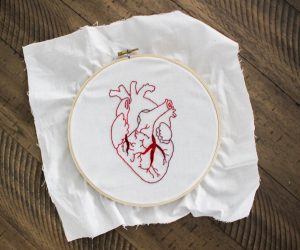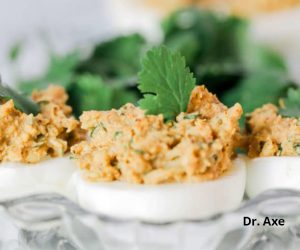
How Fiber Can Improve Your Mental and Brain Health + Tips on Boosting Gut Health and Overcoming Food Sensitivities with GI Specialist Dr. Will Bulsiewicz
Dr. Caroline Leaf – We all know fiber is good for us, but did you also know that it can help with your mental health? In this week’s blog and podcast, I spoke with GI specialist and epidemiologist Dr. Will Bulsiewicz about how a high-fiber diet can help boost mental and brain health, heal food sensitivities and reduce inflammation in the brain and body!
In his amazing new book, Fiber Fueled: The Plant-Based Gut Health Program for Losing Weight, Restoring Your Health, and Optimizing Your Microbiome, Dr. B notes how even though he was very successful as a medical doctor, his processed food diet was making him miserable, tired and anxious. When he met his wife, he began to understand how real, healthy whole foods could transform his life, which led him on the path he is on today: meeting people where they are in their journey and helping them live their best and healthiest lives.
As Dr. B points out, although the current healthcare system is really good at treating acute diseases, it falls short when it comes to preventative medicine and chronic health issues. Indeed, as a medical doctor with multiple qualifications, Dr. B was taught little about the impact lifestyle choices such as diet and exercise could impact our mental and physical health—he had to learn that from his wife! Thankfully, times are changing, especially as more and more research is being published on the importance of our lifestyle choices. We now know that pills and procedures are not everything; around 20% of diseases are genetic, which means 80% are related to our diet and lifestyle. This is great news! It means that our health is largely in our hands, which very empowering.
In fact, we are just beginning to understand the importance of the gut-brain connection and diet on our mental and physical health. 15 years ago, we largely dismissed the role of our gut, but now we know that it is integral to our mental and physical health. As I discussed in a recent blog and podcast (episode #156), the gut is your brain’s best friend. They are constantly talking to each other like teenagers! There are 500 million nerve cells in the gut (5 x more than the spinal cord!), which send signals through vagus nerve to the brain, affecting our sympathetic and para-sympathetic nervous systems, hormones and the rest of your brain and body. Indeed, 90% of the neurotransmitter serotonin is produced in the gut, which not only regulates our mood, energy levels and focus, but also impacts our motility, that is our ability to digest, absorb and eliminate food products. When you damage the microbiome, you damage serotonin production, which affects and mood, which then impacts the rest of brain and body!
One of the best ways we can ensure that our gut microbiome is happy and healthy is what Dr. B calls the production of postbiotics. We have all heard of probiotics (good bacteria) and prebiotics (the fiber that feeds the good bacteria in the gut). The magic happens when these two come together to form postbiotics which are necessary for a great digestive system, such as short chain fatty acids. These postbiotics not only heal things like leaky gut, but they also help with “leaky brains”, repairing the blood-brain barrier and helping us think clearly and quickly and boosts our mood, while helping protect us against the onset of cognitive decline.
We get these postbiotics by eating a healthy, plant-rich diet, which is high in fiber that exercises the gut, feeding the good bacteria we need for digestion and keeping us happy and healthy! In fact, a high fiber diet can even reduce the inflammation associated with cardiovascular disease. When we eat a wide diversity of plants from fruits, veggies, nuts, seeds, grains and so on, we are supporting a wide diversity of good bacteria in our gut—every plant has a unique mix of fiber that feeds a unique mix of bacteria. This way of eating helps us live long and healthy lives, just like the people in what is known as the blue zones—areas of the world where there is the highest life expectancy, which I talked about in a recent blog and podcast (episode #149).
A high fiber, plant-rich diet can also help with food sensitivities. As humans, we only have 17 digestive enzymes, so we need some digestive help from the good bacteria in our stomach. If, however, our microbiome is damaged or unhealthy, we can develop food sensitivities, especially if we are eating a highly processed and refined Modern American diet, known as MAD, that is so common today (I discuss this in detail in my book Think and Eat Yourself Smart). If we eat a diet rich in plant fibers, we can start to heal the gut microbiome, feeding the good bacteria that helps break down our food. However, like many things in life, this is a process and takes time, so learn to listen to your body and give yourself grace! Start small and where you are, and realize that the healing process may involve some pain and discomfort. Like training your body at the gym, you are training your gut to be healthy and strong again!
There Are Also Other Non-Diet Related Ways We Can Boost Our Gut Health and Heal Our Microbiome
1. Get more sleep!
A good night’s rest helps heal and repair the brain and the gut, so make sure you are catching those z’s! You can do this by avoiding blue light exposure before bed (for more on this see my blog and podcast episode #114). If you are battling to fall asleep at night, you can also try eat dinner earlier and water fast before bed.
For more on sleep, see my blog and podcast episode #97.
2. Exercise.
Exercise does wonders for our mental and physical health, and can really help boost our gut health and aid digestion! For more on the benefits of exercise, see my recent blog and podcast episode #139.
3. Practice mind management.
As I have mentioned many times before, we need to manage our mind, which plays a massive role in our gut health! Toxic stress and chaotic, uncontrolled thinking both directly and indirectly impact the balance in our gut (as discussed above), so we should take the time to control our thinking through practices like yoga, meditation and mindfulness. My SWITCH app is a great tool for helping you learn how to manage your mind, deal with the root of your stress and anxiety, and overcome negative thought patterns and behaviors that impact gut health through the mental process of reconceptualization. It is now on sale less 50% for a 3-month subscription!
I also recommend taking a lot of “thinker moments” throughout the day, where you switch off to the external and just let your mind wander and daydream. These moments give your brain a rest and allow it to reboot and heal, which increases your clarity of mind and ability to problem-solve when faced with a tough situation. So, be intentional about creating “thinker” breaks throughout your day by taking a few moments every day, or when you are feeling stressed out! For more information on thinker moments and how to make them a part of your daily routine, see my book, Think, Learn, Succeed.
To read the original article click here.
For more articles from Dr. Leaf click here.






